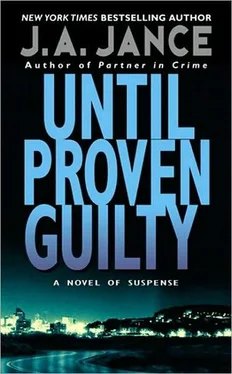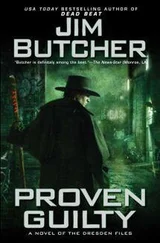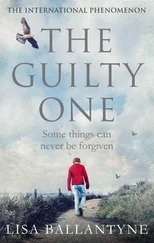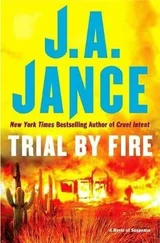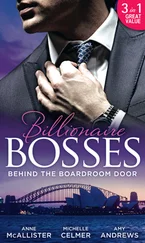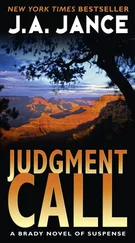J. Jance - Until Proven Guilty
Здесь есть возможность читать онлайн «J. Jance - Until Proven Guilty» весь текст электронной книги совершенно бесплатно (целиком полную версию без сокращений). В некоторых случаях можно слушать аудио, скачать через торрент в формате fb2 и присутствует краткое содержание. Жанр: Детектив, на английском языке. Описание произведения, (предисловие) а так же отзывы посетителей доступны на портале библиотеки ЛибКат.
- Название:Until Proven Guilty
- Автор:
- Жанр:
- Год:неизвестен
- ISBN:нет данных
- Рейтинг книги:4 / 5. Голосов: 1
-
Избранное:Добавить в избранное
- Отзывы:
-
Ваша оценка:
- 80
- 1
- 2
- 3
- 4
- 5
Until Proven Guilty: краткое содержание, описание и аннотация
Предлагаем к чтению аннотацию, описание, краткое содержание или предисловие (зависит от того, что написал сам автор книги «Until Proven Guilty»). Если вы не нашли необходимую информацию о книге — напишите в комментариях, мы постараемся отыскать её.
Until Proven Guilty — читать онлайн бесплатно полную книгу (весь текст) целиком
Ниже представлен текст книги, разбитый по страницам. Система сохранения места последней прочитанной страницы, позволяет с удобством читать онлайн бесплатно книгу «Until Proven Guilty», без необходимости каждый раз заново искать на чём Вы остановились. Поставьте закладку, и сможете в любой момент перейти на страницу, на которой закончили чтение.
Интервал:
Закладка:
I thought about the cat in the sink. “No thanks,” I said. “I’m fine.”
“I’ll have some tea,” Peters said agreeably, “but I like the water boiling.”
“Absolutely,” Sophie said, hurrying into the kitchen. “Tea doesn’t steep properly if the water’s only lukewarm.”
I didn’t trust myself to say anything to Peters in her absence. What I did do was check the notes I had taken from the previous day’s statements. There was no mention of Sophie Czirski.
She returned a few minutes later with a tray and three chipped but dainty cups and saucers. If she had heard my polite refusal, she ignored it. She passed me a cup and saucer without asking. Peters winked at me behind her back as she placed it in my hand. There was a cat hair floating on the surface of my tea. I discreetly removed it with my spoon once her back was turned.
She settled comfortably into the rocking chair with her own cup. “Now then, what was I saying? Oh yes, I called Child Protective Services right then, that very day. I’m sure they thought I was just a nosy old biddy, although they said they’d look into it. I don’t think they ever did, at least not then.
“About a week later I was just finishing watching ”Good Morning America“ when she came wandering down the street. Henry was outside. She went up to try to pet him, but he doesn’t like children. When he wouldn’t let her touch him I could see it almost broke her heart. She didn’t cry, though. I never did see her cry. She looked so lonesome that I just couldn’t help myself. I went to the door, my back door, the one you came in by, and asked her if she’d like to have some cookies and milk.
“She did. She marched right in as if she owned the place.” Sophie stopped, put down her cup, and wiped her eyes with a lacy handkerchief. “She talked a blue streak. She called me Soapy.” Sophie sniffed noisily and wiped her eyes again. “She loved to talk. She talked about that church her mother goes to, meetings every night until the wee hours. She came to see me every morning for almost two weeks, but she was always careful to be back home before her mother woke up. Can you imagine a mother sleeping until eleven or twelve every single day and leaving that poor little tyke on her own?”
“Did she ever say anything about her father?”
Sophie wrinkled her forehead in thought. “No, she never did. She talked about her mother, and an Uncle Charlie, and that minister fellow. I don’t know this Uncle Charlie.”
“She talked about Brodie?” Peters asked.
Sophie nodded. “Yes, a lot. She was afraid of him.”
“I can’t say that I blame her,” Peters said.
“One day he drove up while Angela was still here. I never called her Angel. I think that’s a terrible name to pin on a little girl. Anyway, she tried to run home, but he caught her coming through the gate. He grabbed her and dragged her home by one arm. The next day she had a cast on it.”
“You mean he broke her arm?”
“That’s not what they told Child Protective Services. Some young investigator, a snot-nosed kid still wet behind the ears, came out then to look into it. I talked to him, told him what I had seen, but it didn’t make any difference. He insisted Angela said she had fallen down. He didn’t care that I had seen a handprint on her face or bruises on her arms.”
I had been taking notes the whole time.
“You said she talked about Uncle Charlie. Who’s he?”
Sophie glowered. “How should I know? He’s probably from that group. She never came back again after that, wouldn’t even wave to me from the yard! I know they killed her though; I’m just as sure of it as I can be. And you can write that down, young man!” Sophie Czirski put down her teacup and wept into her handkerchief.
We sat and waited for her to finish crying. “If only Child Protective Services had listened to me, she wouldn’t be dead right now. I have half a mind to call the governor’s office and complain.”
That seemed like a splendid idea to me. “We had officers in the neighborhood last night, asking questions. I didn’t see your name on any of the reports.”
“Oh no,” she said. “Thursday I have my doctor’s appointment; then I go to Bainbridge on the ferry and stay overnight with my son and his family. That’s the one night a week I baby-sit my grandchildren.”
We asked more questions, but she could add no more details, at least not then. The doctor’s appointment had prevented her from seeing any unusual vehicles the day of the murder. I couldn’t help but marvel that so far Maxwell Cole had overlooked Sophie. I hoped that would continue to be the case, but I didn’t want to trust to luck.
“Did you happen to notice the Volvo that was at Barstogi’s house when we drove up?” I asked as we were getting ready to leave.
“A what? Oh, the brown car. I haven’t seen it before.”
“It belongs to a reporter. His name is Maxwell Cole.”
“Is he the one who wrote the article this morning?”
She was a sharp old dame. Nothing much got past her.
“Yes,” I answered. “He was over there talking with Suzanne Barstogi and Brodie when we drove up. If he comes nosing around asking questions, I’d appreciate it if you wouldn’t say anything to him. I’d especially like it if he didn’t learn any of what you’ve told us.”
For the first time she looked at me as though I might possibly be a member of the human race. “You mean you think this might be important?”
“I’m sure it’s important, and I don’t want the papers to get ahold of it until after we have a chance to check it out.” Unexpectedly, Sophie Czirski started crying again. They seemed to be tears of gratitude that at last someone was taking her seriously, paying attention. I was grateful we had gotten to her first.
“I wouldn’t give him the time of day,” she said determinedly when the third bout of tears finally abated. She pulled herself together long enough to let us out. We heard her padlock the gate behind us.
It was getting on toward afternoon. The storm that had been hinted on the breeze the night before finally drifted in off the Pacific, kicking up the wind and bringing with it a drenching downpour. Seattle is used to the kind of gentle drizzle that lets people walk in the rain for blocks without an umbrella and without getting wet. This was not that kind of storm. The wind would have gutted any umbrella we had tried to use. We were glad to retreat to the car.
We had barely gotten inside when Peters picked up the preliminary report that had been carelessly dropped in the backseat. He studied it for a few minutes, then handed it to me, pointing at a paragraph close to the bottom. It was something we had missed the first time, and Maxwell Cole evidently hadn’t given it any notice either. In her death struggle, Angela’s Barstogi’s left arm had been broken. Actually a recent fracture had been rebroken. In addition, X rays revealed an old break in her right arm and one on her left leg.
“Must have been a really accident-prone kid,” I said sarcastically.
“Right,” Peters replied. He was looking at Suzanne Barstogi’s house. Like me, he was probably thinking about the living room full of kneeling supplicants. “I’ll just bet that asshole’s our man.”
“Could be,” I said. “Sounds more plausible all the time.”
“And Suzanne Barstogi’s an accessory!” Peters ran his hand over his forehead and hair in a gesture of hopelessness. For a time he was quiet, waging an internal war.
“You ever hear of Broken Springs. Oregon?” he asked at last. It was an off-the-wall question. I thought for a minute, then shook my head without making any connection. He continued. “It’le place in central Oregon south of The Dalles that’s been taken over by a cult. The peons eat long-grain rice and go without, while the swami or whatever the hell he is rides around in one of his thirty or so Cadillacs. My ex-wife and kids are there.”
Читать дальшеИнтервал:
Закладка:
Похожие книги на «Until Proven Guilty»
Представляем Вашему вниманию похожие книги на «Until Proven Guilty» списком для выбора. Мы отобрали схожую по названию и смыслу литературу в надежде предоставить читателям больше вариантов отыскать новые, интересные, ещё непрочитанные произведения.
Обсуждение, отзывы о книге «Until Proven Guilty» и просто собственные мнения читателей. Оставьте ваши комментарии, напишите, что Вы думаете о произведении, его смысле или главных героях. Укажите что конкретно понравилось, а что нет, и почему Вы так считаете.
